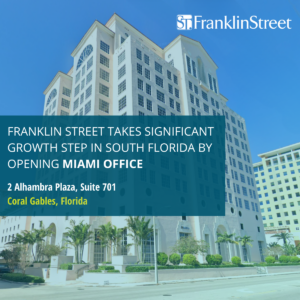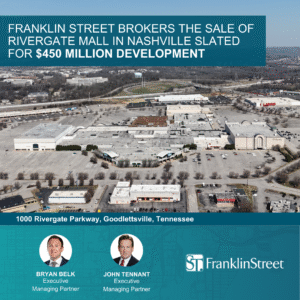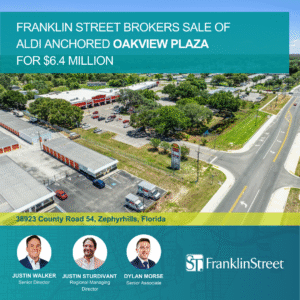Retail season has kicked off, as November brings Black Friday and holiday shopping. But some retail experts are already looking ahead to 2016, as North Florida’s market is growing enough to support new and expanded stores.
“With the rapid growth across North Florida, along with revitalization of older neighborhoods, there are more markets than ever to consider when opening a new store or expanding your business,” wrote Franklin Street‘s Director of Retail Leasing Whitney Kantor, in a tip sheet to retailers.
Kantor says that while location is one of the key factors retail businesses consider while opening a store, there are several other items new and expanding retailers should evaluate before opening their brand.
• Consider your concept: When looking at location, Kantor suggests thinking about what type of center works best for your business. Whether your brand works best in a neighborhood, mixed-use project, lifestyle center or can draw its own attention in a standalone building, focus on what surroundings will attract the highest number of customers.
• Think about your business drivers: It could be your business is dependent on the surrounding income level, daytime traffic in the area or proximity to other retailers. “Be certain to share these drivers with the landlord,” Kantor suggests. “The more a leasing agent knows about your business the more helpful they can be with strategically matching available space with your concept to maximize success for you and the entire shipping center.”
• Customer experience: Kantor said it can be just as important to think about the customer experience outside the retail operation as it is to think about what the in-store experience is. She suggests asking the owner of the center what their merchandising and maintenance strategies are. “The retail lease is a pertnship with most owners welcoming ideas and thoughts that could enhance their properties to make the overall shopping experience a better place for the consumer to shop,” she wrote.
• Get an understanding of the retail market: Location decisions shouldn’t be strictly on price, Kantor said. In searching for a retail space, know what competitive sites are offering for their market rents. Rent is driven not only by location, but by visibility within the center, what other retailers are in the center and what the center generates in sales volumes.
• Evaluate lease terms: Kantor says after location, the greatest impact on long-term success is the lease. “The terms of a lease can impact your nimbleness in the market place and can directly impact your brand,” she wrote.
• Mobility: If a major anchor tenant leaves your shopping center, it could reduce traffic. If that’s the case, you may want to think about contingency plans should that happen — including relocation to a new center.
• Understand the business life cycle: If you’re thinking about selling your business in the next three to 10 years, Kantor urges awareness of length of term. If the potential buyer has difficulty continuing to operate the business in the same location, it can impact the purchase price of the business.
• Think about your total: Know the difference between gross rent lease — which is all inclusive — and a triple net lease — which requires a tenant pay a base rent and proportionate share of the owner’s maintenance expenses, insurance and taxes.
Finally, Kantor says successful shopping centers come from collaboration between the landlord and tenant.
“Shopping center owners successfully positioning retail projects in the marketplace to draw the right tenants combined with knowledgeable, savvy tenants who negotiate locations and lease terms that help both the themselves and the owner grow sales and value create a win-win environment for owners and retailers,” she wrote.



